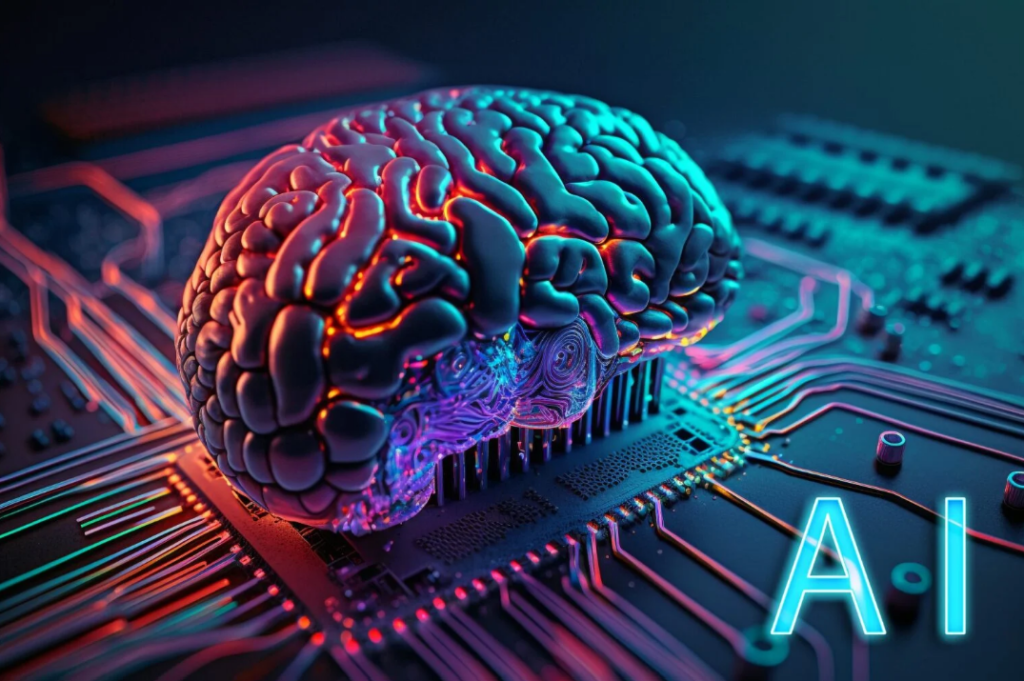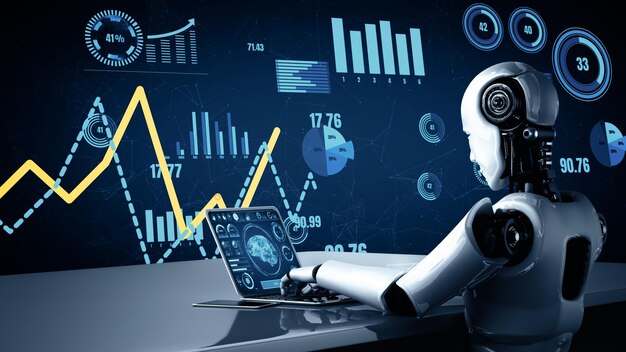In the evolving digital world, Artificial Intelligence (AI) stands out as one of the most revolutionary forces shaping business operations and strategies. By enabling enhanced data analysis, automation, and deep learning insights, AI is transforming business analytics from a reactive process into a proactive, predictive powerhouse. This guide provides an in-depth view of how AI in business analytics is changing the way companies utilize data, make decisions, and sustain growth.
Introduction: The AI Revolution in Business Analytics
The introduction of Artificial Intelligence in business analytics marks a pivotal shift. In an era of data-driven decision-making, AI enhances businesses’ ability to interpret large volumes of data with speed and precision. The use of AI helps reduce the time from data collection to actionable insights, thus allowing companies to make quick, strategic adjustments based on real-time analytics. As companies embrace AI data analytics, it becomes a core competitive advantage, helping them respond dynamically to market trends, customer demands, and operational challenges.

Understanding Business Analytics and AI Integration
Business analytics, at its core, involves interpreting data to inform decision-making. The integration of Artificial Intelligence transforms traditional analytics by allowing for sophisticated, autonomous data handling. With AI in business analytics, companies can perform more advanced functions like predictive modeling, anomaly detection, and intelligent automation. This integration has redefined how businesses approach data, enabling a more agile, adaptive approach that can handle growing data complexity. The technology supports analysts by delivering refined, high-quality insights without requiring exhaustive manual intervention.

Automated Data Preparation and Cleansing
Data preparation, which often involves organizing, cleaning, and formatting data, is a vital step for any analytics project. Historically, this step could take up to 70% of the data process, but AI data analytics tools can now automate this stage, saving considerable time. AI algorithms cleanse data by filling in missing values, identifying and correcting inconsistencies, and organizing unstructured data into formats that are easily analyzable. The result is data that’s ready for immediate analysis, which reduces time lags and significantly improves the accuracy of the resulting insights.

Enhanced Data Discovery and Insight Generation
AI-powered business intelligence has redefined data discovery, allowing businesses to identify hidden trends, patterns, and relationships that traditional analytics methods might miss. Through natural language processing (NLP) and machine learning, AI systems can categorize data into meaningful clusters, summarize trends, and predict potential outcomes. This level of insight generation is invaluable for sectors such as marketing, where understanding consumer behaviors, preferences, and trends can guide more targeted strategies. Moreover, AI-driven discovery allows businesses to detect anomalies quickly, preventing potential losses and improving operational efficiency.

Predictive Analytics for Smarter Decision-Making
Predictive analytics is one of the most potent applications of Artificial Intelligence for business insights. By analyzing historical data and learning from patterns, AI models can forecast future scenarios with remarkable accuracy. For example, predictive models can help retail businesses optimize inventory levels based on anticipated demand or assist financial institutions in assessing risks and forecasting revenue. In decision-making, these predictive insights reduce uncertainty, enabling leaders to make more informed, forward-looking decisions.
Real-Time Business Intelligence through AI
The speed at which businesses need to operate today has led to an increased demand for real-time analytics. AI fulfills this need by enabling real-time business intelligence, providing timely insights for immediate decision-making. Industries that rely heavily on quick reactions, such as e-commerce, finance, and healthcare, benefit from real-time AI insights to make agile decisions. For example, an e-commerce platform can dynamically adjust pricing based on real-time data, or a financial institution can monitor fraud indicators as transactions occur.
The Role of Machine Learning in Business Analytics
Machine learning, a subset of AI, enhances business intelligence with AI by allowing models to learn from data patterns and improve over time. These algorithms refine their predictions and insights as more data becomes available, eliminating the need for constant human oversight. In practice, machine learning can improve processes across numerous applications: optimizing marketing campaigns, improving customer segmentation, and refining operational strategies. This makes machine learning an invaluable asset for any business looking to scale analytics and make data-driven adjustments in near real-time.
Augmented Analytics and the Rise of Citizen Data Scientists
AI-powered augmented analytics tools have democratized data analysis, giving non-technical employees access to powerful analytics capabilities. This shift has led to the rise of “citizen data scientists,” where employees across various functions can participate in data-driven decision-making. Through intuitive dashboards and easy-to-use AI tools, non-specialists can generate insights, creating a more data-empowered workforce and reducing the reliance on specialized analysts. This democratization supports a more holistic approach to data, as decisions are informed by perspectives from diverse business functions.
Challenges and Limitations of AI in Business Analytics
While AI in business analytics has impressive capabilities, it does come with challenges. AI models require high-quality data, and any biases or errors in data can lead to inaccurate conclusions. Data governance and compliance are critical to ensure models work as intended. Additionally, AI cannot fully replicate human intuition, creativity, and ethical considerations. Balancing automation with human oversight is essential to ensure AI is used responsibly and accurately.
Case Studies of AI-Driven Business Analytics Success
Case studies of successful AI applications in business analytics highlight the technology’s transformative impact across industries. For example, in healthcare, AI-driven analytics are used to predict patient outcomes, manage resources, and personalize treatment plans. Retailers use AI to optimize supply chains, personalize customer experiences, and manage inventory. These success stories underscore the real-world potential of AI when implemented effectively, with benefits ranging from cost savings to enhanced customer satisfaction.
The Future of AI in Business Analytics
The future of AI data analytics looks promising, with advancements in deep learning, edge computing, and immersive analytics expected to further enhance business intelligence. Emerging trends in AI technology suggest that analytics tools will become more interactive, contextual, and adaptive, capable of handling complex tasks and supporting decision-making with minimal human input. As these advancements evolve, businesses that embrace AI will be better equipped to handle the increasing complexity and scale of data analysis.
Best Practices for Implementing AI in Business Analytics
Successfully implementing AI in business analytics requires careful planning. Key best practices include investing in data quality, selecting AI tools that align with specific business goals, and developing a data governance strategy. Regular model monitoring is crucial to ensure accuracy and fairness, while employee training is necessary to bridge the knowledge gap. By aligning AI adoption with business objectives, organizations can maximize the return on their AI investments, ensuring a smooth and impactful transition into data-driven decision-making.
Conclusion
In conclusion, Artificial Intelligence is not only redefining business analytics but also setting new standards for how organizations leverage data. With AI’s ability to automate, enhance, and accelerate analytics, businesses are now equipped to make smarter, faster, and more informed decisions. As AI continues to mature, its integration into business analytics will be key to unlocking more profound insights, improving customer experiences, and driving sustainable growth. Embracing these AI and business trends will be essential for companies striving to thrive in a highly competitive, data-centric landscape.





